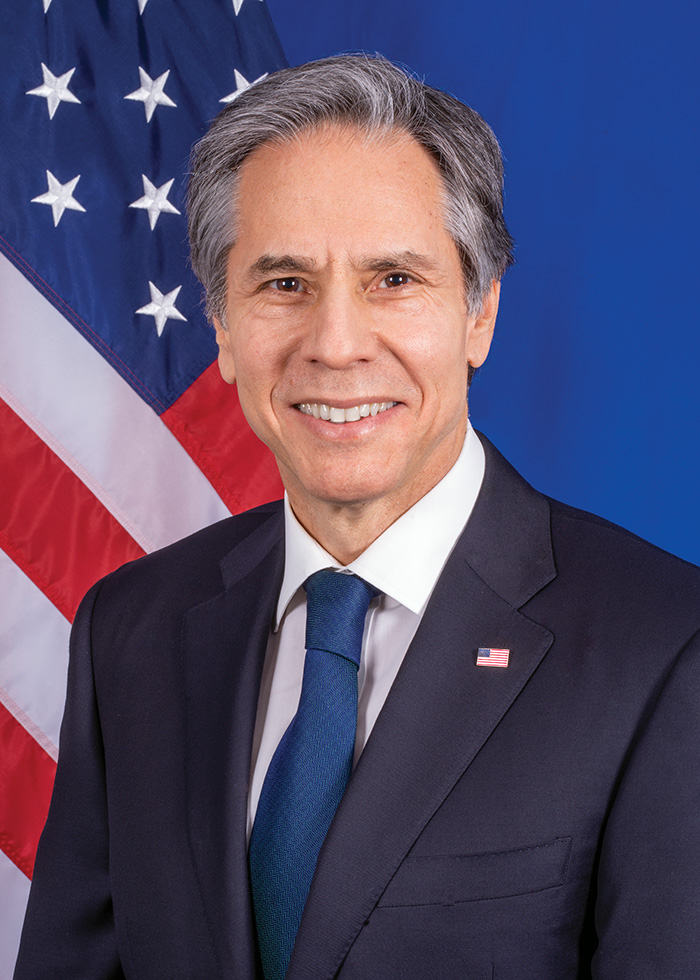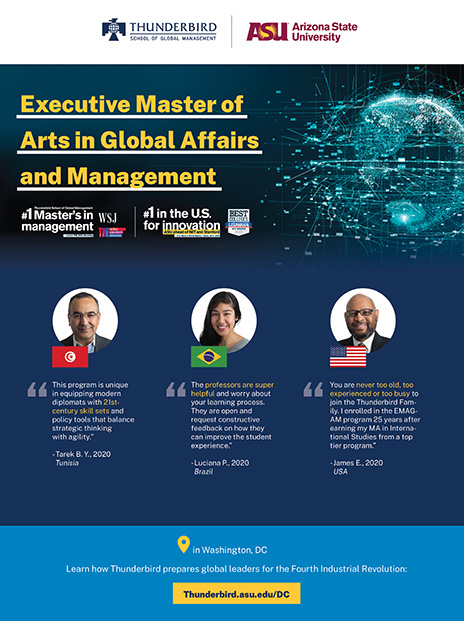On Moves to Modernize: An Interview with Secretary of State Antony Blinken

Antony Blinken was sworn in as the 71st U.S. Secretary of State on Jan. 26, 2021. He previously served as Deputy Secretary of State (2015-2017) and as deputy national security adviser (2013-2015), among other top foreign policy positions. He first served at State nearly 30 years ago as special assistant in the Bureau of European and Canadian Affairs (1993-1994).
Secretary Blinken launched a major reform initiative in an Oct. 27 speech at the Foreign Service Institute. Shortly after that, the FSJ had the opportunity to ask him about the specifics of this effort and next steps for modernization. We appreciate his engagement and candor.
—Shawn Dorman, Editor
FSJ: For 50 years the State Department has come up short on some of its management promises regarding professional training, diversity and IT infrastructure. How will this administration deliver a training float, a Foreign Service that looks like America and world-class IT?
Secretary Blinken: I have no illusions about how difficult it is to make transformative change in an institution of our size and complexity. But I think we can deliver for three reasons.
First, the department has demonstrated the capacity to renew and reinvent itself at previous inflection points. We’re at one of those moments now. Our modernization agenda is not just a new list of management priorities by a new administration. It reflects our commitment to equip the department to lead the reorientation that is occurring in U.S. foreign policy to focus on the forces that most directly and consequentially affect Americans’ lives, livelihoods and security—from addressing COVID-19 and the climate crisis to protecting critical data and infrastructure and shaping the rules that govern transformative new technologies. And that focus will increasingly be at the heart of our alliances and partnerships—and our engagement with strategic competitors.
Second, we’re not reinventing the wheel or commissioning yet another study. Instead, we’re drawing on the extensive and thoughtful work that has already been done—inside and outside the State Department. There is broad agreement on both the challenges and many of the remedies, as well as bipartisan support in Congress for action.
And third, this agenda has been shaped and informed by the people who know and care most about this place—the career workforce.
The agenda I laid out in October is the floor, not the ceiling, of our ambitions. We’ve already taken a number of significant steps.
In our first budget request, we asked for a 10 percent increase for the department. Among other things, we will use that to fund investments in IT and create nearly 500 new positions—the biggest State Department hiring increase in a decade.
We appointed State’s first chief diversity officer, whose team just released a plan to identify and address specific barriers to diversity, inclusion, retention and accessibility—a key step toward ending the unacceptable inequities that we all know persist.
We lifted more than half of all assignment restrictions that have disadvantaged employees of certain backgrounds, and we’re creating a new appeals process to ensure fairness and transparency.
We’ve moved to stand up a new bureau for cyberspace and digital policy, and we’re appointing a new special envoy for critical and emerging technology.
FSJ: You said in the speech at FSI that you will seek authorities and policies that allow diplomats to manage risk more effectively and smartly. Can you tell us more about this new risk management platform and how it will be implemented?
Secretary Blinken: My first responsibility is to ensure the safety of our people and their families in the field. From the COVID-19 pandemic to anomalous health incidents, the risks facing U.S. diplomats overseas are as significant and complex as ever.
But we must find ways to address these threats and risks without losing the in-person diplomacy and public engagement that are at the core of our profession. That’s a message I’ve heard loud and clear from every part of our workforce, everywhere I’ve traveled, including at our highest-risk posts.
Over the last 20 years, we’ve moved many U.S. embassies, consulates and American Centers out of city centers and into more hardened facilities where they’re less accessible to the people they were created to reach. In some cases, there were good reasons for those moves. But there have also been some unintended consequences. It’s become immensely difficult to open new posts, even in low-threat environments; and it’s harder than it should be to adjust our presence to respond to crises and opportunities. Last year, China surpassed the United States in total number of diplomatic and consular posts. We make it harder to outcompete China when we are so hindered in how and where we can operate. We’ve got to fix that.
As our diplomats know, a world of zero risk is not a world in which we can deliver for the American people. We have to accept risk and manage it smartly. One way to do that is by working with Congress to update the legislation that governs our physical security requirements overseas and reforming the Accountability Review Board process. Here, too, there is bipartisan support to update our mindset and operations, focusing more on lessons learned and less on individual culpability when it comes to security incidents.
So I’m optimistic that we’ll be able to make some commonsense changes that will strengthen our diplomacy while continuing to keep our people safe.
FSJ: We applaud your efforts to solicit more input, including dissenting views, from employees. How will input to the new Policy Ideas Channel and the revitalized Dissent Channel be utilized, and how will it be coordinated with the relevant bureaus and employees? Does the input feed into internal policy deliberation or is it outside that process?
Secretary Blinken: All of us want to work in an institution that welcomes creative ideas regardless of where they come from, and where constructive dissent is valued. Research shows that teams are stronger, smarter and more innovative when they draw on the widest range of ideas and expertise, and involve those from different backgrounds and generational perspectives. I’ve seen this to be true everywhere I’ve worked—inside and outside government.
That’s why I called for the creation of the Policy Ideas Channel. Its goal is to ensure new and different perspectives can be heard and considered, to break down silos, and to build institutional knowledge and collaboration. The channel was designed with an express focus on promoting transparency, consultation and strengthening the policy process, not circumventing it. My Policy Planning Staff reviews submissions and raises them to the attention of senior leadership. We don’t want to just identify good ideas, but act on them.
I’ve focused on revitalizing the Dissent Channel because I believe to my core that dissent must be welcomed and heard. It’s patriotic, and it makes our institution stronger. I personally review each dissent and reply and share them with Deputy Secretaries Sherman and McKeon and Under Secretary Nuland. I’ve received more than a dozen to date, and they’ve led to specific, concrete and meaningful policy changes.
FSJ: As you know, success in diversity and inclusion is not just about recruitment but about retaining and developing employees after hiring. What do you see as the primary barrier to success, and how do you plan to overcome it?
Secretary Blinken: Our country’s diversity is a huge competitive advantage. We're operating in a diverse world. When we fully leverage everyone and everything our nation has to offer, our foreign policy is stronger, smarter and more creative. And yet, the State Department has consistently failed to leverage this strength, especially at senior levels. We must do better.
Under the leadership of Ambassador Gina Abercrombie-Winstanley, the department’s first stand-alone chief diversity and inclusion officer, we’ve taken a number of steps to identify where the barriers are and what factors may drive attrition among underrepresented groups. Ambassador Abercrombie-Winstanley and her team have launched a working group specifically focused on data, because we need a more precise sense of the challenge and a better way to track progress and hold ourselves accountable.
We’ve just released a preliminary strategic plan for diversity, equity, inclusion and accessibility (DEIA) that is open for input from throughout the department. Local staff, family members, contractors and members of the Civil Service and Foreign Service can all provide feedback that will be incorporated into the final strategy over the next few months. That strategy will identify barriers that have prevented the department from reflecting the country’s diversity at all levels, and lay out steps to address them.
As I’ve said before, turning this into an institution where all people are treated with dignity and respect is the work of every single employee. It will take all of us to transform our department into a more just and equitable workplace for all.
FSJ: Pillar Four includes plans to review the Afghanistan evacuation, but State has not been known for its lessons-learned practices. What makes this time different, especially in light of the politicization of the withdrawal, the ongoing challenges in Afghanistan and relocation and resettlement efforts?
Secretary Blinken: We can and should have an honest debate about the plans and preparations for withdrawal, contingency planning and crisis management. I’m committed to undertaking a rigorous process to do that. I’ve asked Ambassador Dan Smith, who recently retired as one of State’s most respected career ambassadors, to lead a review focused on the department’s planning for, and execution of, relocation and evacuation of embassy personnel, American citizens, special immigrant visa applicants and other Afghans at risk. This review will take place in parallel to reviews other agencies are conducting, similarly focused on policy execution. In addition to this review, we are also undertaking a review of the operations of the task forces.
Between our own review, and those of Congress and the inspector general, there will be no shortage of scrutiny. We should welcome it, learn from it and use it as an opportunity to strengthen our contingency planning, crisis response and decision-making processes. We’re already working to apply some of the lessons learned in places such as Ethiopia; the situation there is different, but we are ensuring we’re prepared to address all potential scenarios as they affect our Mission and American citizens in country.
What is not up for debate is the performance of our people—in Kabul, on the task forces, at the bases overseas and across the United States, and the hundreds of volunteers around the world who worked 24/7 to help bring to safety more than 120,000 people under the most difficult conditions imaginable. Those of us in decision-making roles owe it to them to capture what went right and what went wrong, what we learned and what we could have done differently.
FSJ: Is one of your priorities to ensure good career paths for the Foreign Service? What would you say to entry- and mid-level officers today who hope for a shot at deputy chief of mission and ambassador positions in the future?
Secretary Blinken: Absolutely. Throughout my career, I’ve valued and relied on the advice and perspectives of career diplomats.
This administration is committed to doing more to empower public servants and restoring the historic ratio of career ambassadors. We’ve nominated dozens of senior career officials to high-level positions in Washington and the field. Two-thirds of the regional assistant secretaries are career FSOs.
But even as we continue to put Foreign Service officers back in top jobs, I would tell entry- and mid-level officers that we also need problem-solvers and policy entrepreneurs throughout the organization, at all levels. I recently had a chance to convene chiefs of mission from around the world, the vast majority of whom are career diplomats. As I told them, it doesn’t matter whether they are in an acting or confirmed role—I’m looking to them to lead and will have their backs when they do. And I expect them to empower their teams, as well.
We know that a big factor in retention is whether people feel they have meaningful, rewarding, challenging work and an opportunity to advance. Part of that is about organizational culture, and we can and will do more to elevate new voices and reward initiative. It’s also true that promotion pipelines are narrower than in the past for certain grades, cones and specialties, especially at the mid-level. So we need to look at some of those obstacles and find creative ways to overcome them. As a first step, the Director-General’s office is standing up a retention unit, and I am asking the DG to make it a top priority to identify and address the issues that cause people to consider leaving, including concerns about career pathways and promotions.
FSJ: If you can be remembered for one contribution to this institution, not policy but something you did to strengthen the State Department and its people, what would that be?
Secretary Blinken: I committed on my first day in office to leave behind a State Department that is organized and equipped to meet the tests of the 21st century—an even stronger, more effective, agile and diverse institution that can lead America’s engagement in a more crowded and competitive world. That, ultimately, will be the measure of my success as Secretary.
And the most critical factor to achieving that will be recruiting and retaining a workforce that looks like America. Our diversity as a nation in backgrounds and experiences, in race, religion, ethnicity and in countries of origin, is among our greatest competitive advantages. Failing to draw on that diversity shortchanges our foreign policy and our ability to advance our interests in the world.
Read More...
- “Secretary Antony J. Blinken on the Modernization of American Diplomacy,” by Sec. Blinken, October 27, 2021
- “On State Reform,” by Dennis Jett, The Foreign Service Journal, January-February 2021
- “Rebuilding The State Department Under Biden,” by Michele Kelemen, NPR, May 8, 2021





